Ethical Dilemmas and the Protection of Children's Rights in Society
VerifiedAdded on 2020/05/16
|9
|2404
|99
Essay
AI Summary
This essay explores the critical importance of safeguarding children's rights, emphasizing ethical dilemmas faced by individuals in social care settings. It references the UN Convention for the Rights of the Child (UNCRC) and examines how adults' actions impact children, highlighting the need for children to have their own rights. The essay presents a case study of Mayah, illustrating ethical conflicts between parents, educators, and childcare directors. It discusses issues like discrimination, the importance of self-reflection, and the need for clear ethical guidelines in childcare. The author advocates for a humanitarian approach, adherence to ethical codes, and regular communication between educators and families. The essay underscores the significance of considering children's individual needs and developmental stages to ensure their rights are upheld, particularly in diverse and potentially discriminatory environments. The importance of formulating a common set of laws of behavior that would be acceptable towards the children in the modern scenario is also discussed.
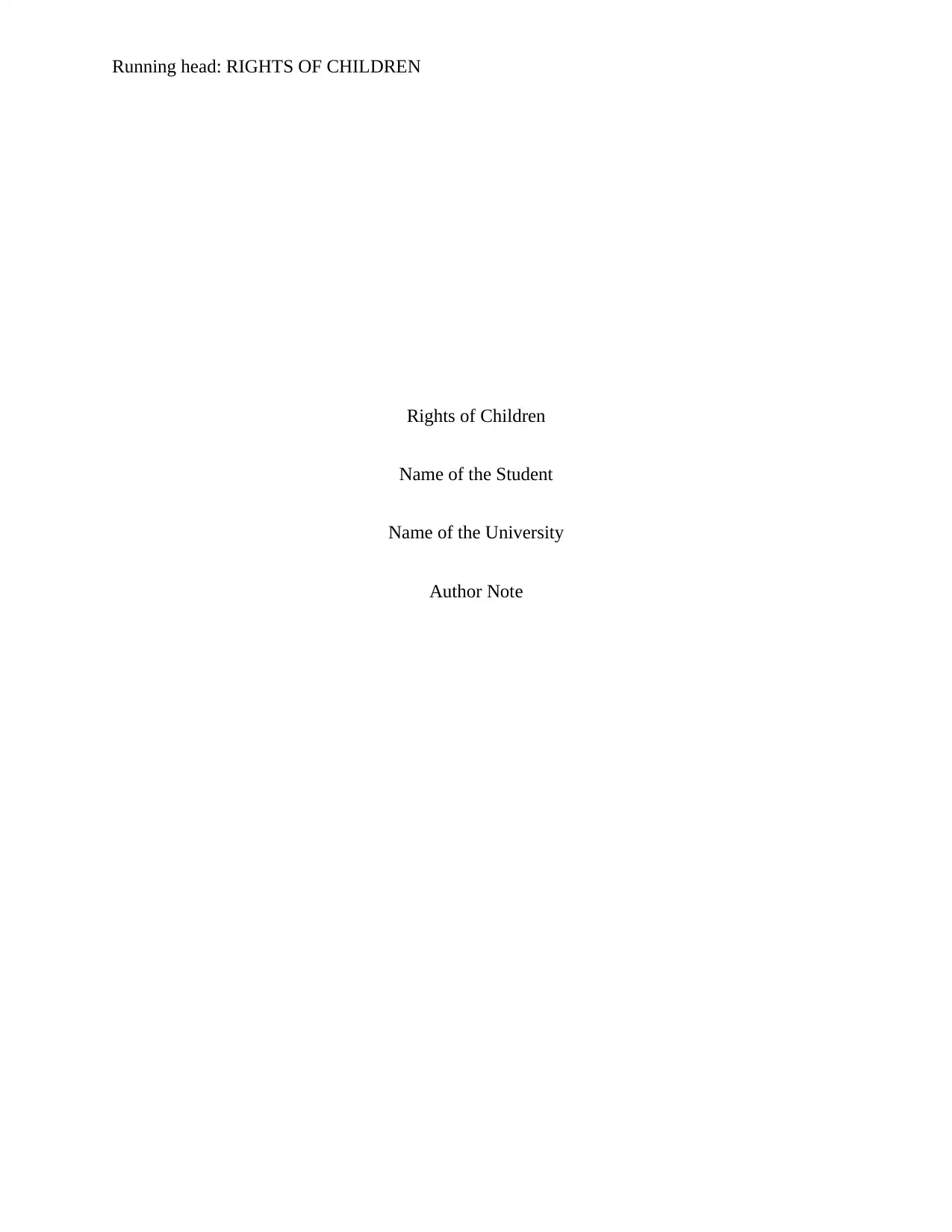
Running head: RIGHTS OF CHILDREN
Rights of Children
Name of the Student
Name of the University
Author Note
Rights of Children
Name of the Student
Name of the University
Author Note
Paraphrase This Document
Need a fresh take? Get an instant paraphrase of this document with our AI Paraphraser
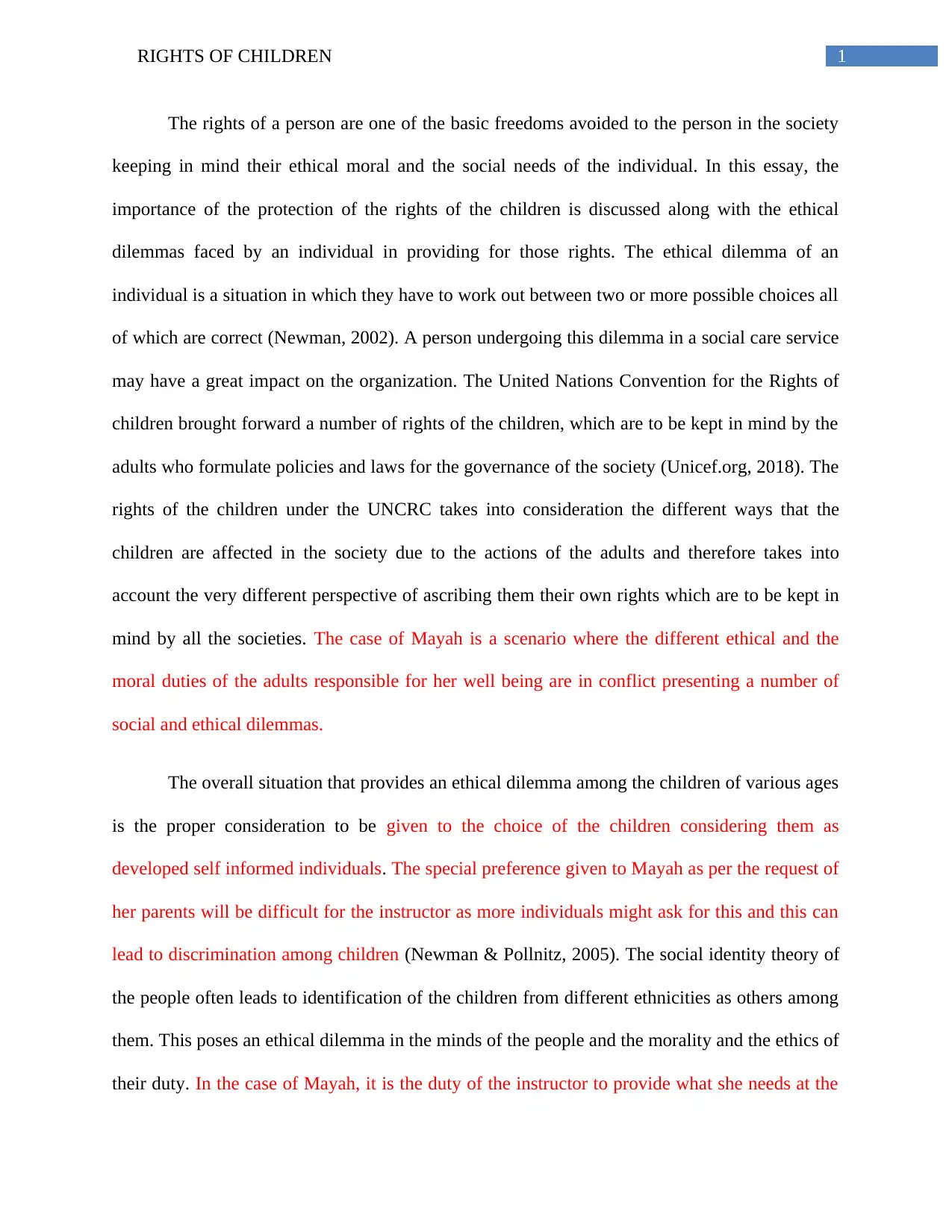
1RIGHTS OF CHILDREN
The rights of a person are one of the basic freedoms avoided to the person in the society
keeping in mind their ethical moral and the social needs of the individual. In this essay, the
importance of the protection of the rights of the children is discussed along with the ethical
dilemmas faced by an individual in providing for those rights. The ethical dilemma of an
individual is a situation in which they have to work out between two or more possible choices all
of which are correct (Newman, 2002). A person undergoing this dilemma in a social care service
may have a great impact on the organization. The United Nations Convention for the Rights of
children brought forward a number of rights of the children, which are to be kept in mind by the
adults who formulate policies and laws for the governance of the society (Unicef.org, 2018). The
rights of the children under the UNCRC takes into consideration the different ways that the
children are affected in the society due to the actions of the adults and therefore takes into
account the very different perspective of ascribing them their own rights which are to be kept in
mind by all the societies. The case of Mayah is a scenario where the different ethical and the
moral duties of the adults responsible for her well being are in conflict presenting a number of
social and ethical dilemmas.
The overall situation that provides an ethical dilemma among the children of various ages
is the proper consideration to be given to the choice of the children considering them as
developed self informed individuals. The special preference given to Mayah as per the request of
her parents will be difficult for the instructor as more individuals might ask for this and this can
lead to discrimination among children (Newman & Pollnitz, 2005). The social identity theory of
the people often leads to identification of the children from different ethnicities as others among
them. This poses an ethical dilemma in the minds of the people and the morality and the ethics of
their duty. In the case of Mayah, it is the duty of the instructor to provide what she needs at the
The rights of a person are one of the basic freedoms avoided to the person in the society
keeping in mind their ethical moral and the social needs of the individual. In this essay, the
importance of the protection of the rights of the children is discussed along with the ethical
dilemmas faced by an individual in providing for those rights. The ethical dilemma of an
individual is a situation in which they have to work out between two or more possible choices all
of which are correct (Newman, 2002). A person undergoing this dilemma in a social care service
may have a great impact on the organization. The United Nations Convention for the Rights of
children brought forward a number of rights of the children, which are to be kept in mind by the
adults who formulate policies and laws for the governance of the society (Unicef.org, 2018). The
rights of the children under the UNCRC takes into consideration the different ways that the
children are affected in the society due to the actions of the adults and therefore takes into
account the very different perspective of ascribing them their own rights which are to be kept in
mind by all the societies. The case of Mayah is a scenario where the different ethical and the
moral duties of the adults responsible for her well being are in conflict presenting a number of
social and ethical dilemmas.
The overall situation that provides an ethical dilemma among the children of various ages
is the proper consideration to be given to the choice of the children considering them as
developed self informed individuals. The special preference given to Mayah as per the request of
her parents will be difficult for the instructor as more individuals might ask for this and this can
lead to discrimination among children (Newman & Pollnitz, 2005). The social identity theory of
the people often leads to identification of the children from different ethnicities as others among
them. This poses an ethical dilemma in the minds of the people and the morality and the ethics of
their duty. In the case of Mayah, it is the duty of the instructor to provide what she needs at the
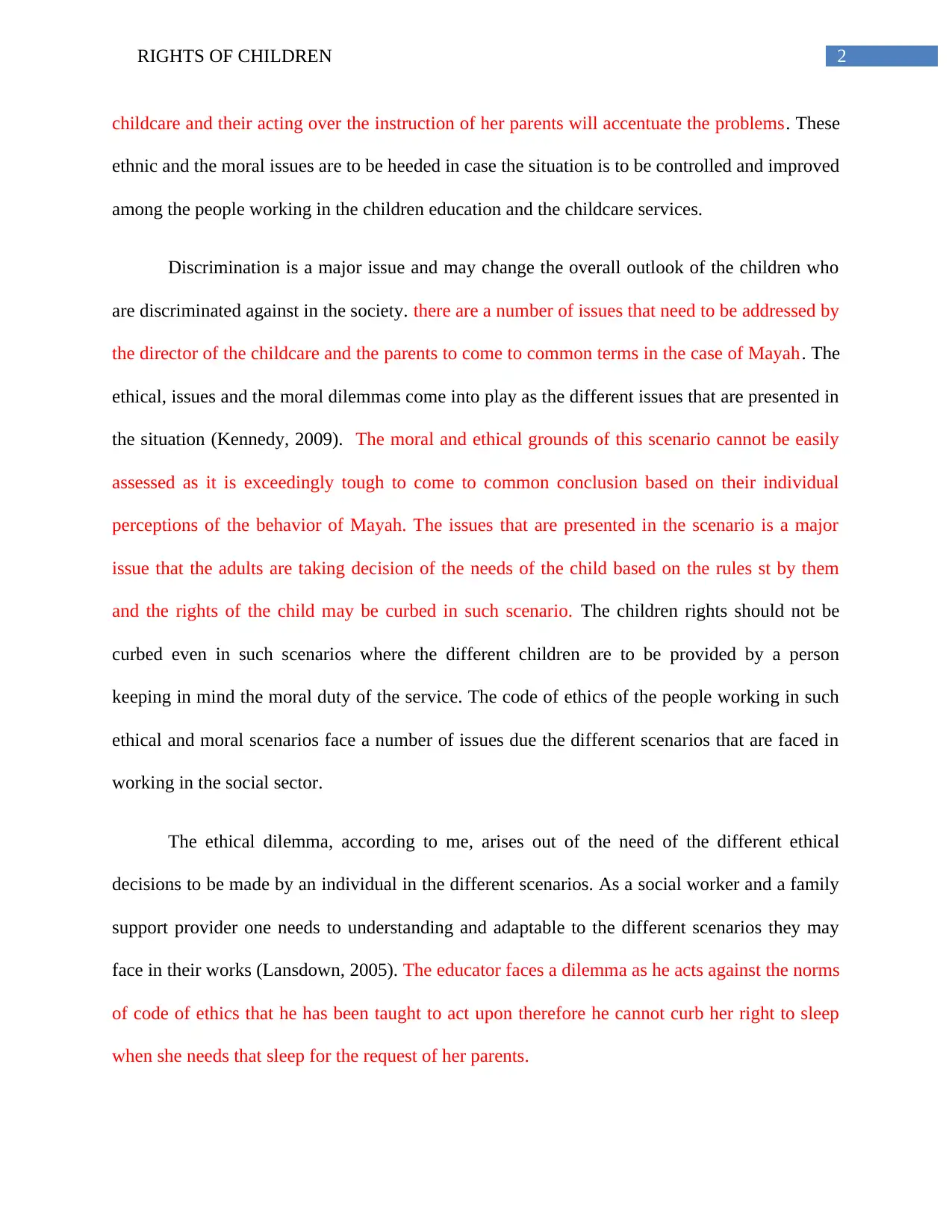
2RIGHTS OF CHILDREN
childcare and their acting over the instruction of her parents will accentuate the problems. These
ethnic and the moral issues are to be heeded in case the situation is to be controlled and improved
among the people working in the children education and the childcare services.
Discrimination is a major issue and may change the overall outlook of the children who
are discriminated against in the society. there are a number of issues that need to be addressed by
the director of the childcare and the parents to come to common terms in the case of Mayah. The
ethical, issues and the moral dilemmas come into play as the different issues that are presented in
the situation (Kennedy, 2009). The moral and ethical grounds of this scenario cannot be easily
assessed as it is exceedingly tough to come to common conclusion based on their individual
perceptions of the behavior of Mayah. The issues that are presented in the scenario is a major
issue that the adults are taking decision of the needs of the child based on the rules st by them
and the rights of the child may be curbed in such scenario. The children rights should not be
curbed even in such scenarios where the different children are to be provided by a person
keeping in mind the moral duty of the service. The code of ethics of the people working in such
ethical and moral scenarios face a number of issues due the different scenarios that are faced in
working in the social sector.
The ethical dilemma, according to me, arises out of the need of the different ethical
decisions to be made by an individual in the different scenarios. As a social worker and a family
support provider one needs to understanding and adaptable to the different scenarios they may
face in their works (Lansdown, 2005). The educator faces a dilemma as he acts against the norms
of code of ethics that he has been taught to act upon therefore he cannot curb her right to sleep
when she needs that sleep for the request of her parents.
childcare and their acting over the instruction of her parents will accentuate the problems. These
ethnic and the moral issues are to be heeded in case the situation is to be controlled and improved
among the people working in the children education and the childcare services.
Discrimination is a major issue and may change the overall outlook of the children who
are discriminated against in the society. there are a number of issues that need to be addressed by
the director of the childcare and the parents to come to common terms in the case of Mayah. The
ethical, issues and the moral dilemmas come into play as the different issues that are presented in
the situation (Kennedy, 2009). The moral and ethical grounds of this scenario cannot be easily
assessed as it is exceedingly tough to come to common conclusion based on their individual
perceptions of the behavior of Mayah. The issues that are presented in the scenario is a major
issue that the adults are taking decision of the needs of the child based on the rules st by them
and the rights of the child may be curbed in such scenario. The children rights should not be
curbed even in such scenarios where the different children are to be provided by a person
keeping in mind the moral duty of the service. The code of ethics of the people working in such
ethical and moral scenarios face a number of issues due the different scenarios that are faced in
working in the social sector.
The ethical dilemma, according to me, arises out of the need of the different ethical
decisions to be made by an individual in the different scenarios. As a social worker and a family
support provider one needs to understanding and adaptable to the different scenarios they may
face in their works (Lansdown, 2005). The educator faces a dilemma as he acts against the norms
of code of ethics that he has been taught to act upon therefore he cannot curb her right to sleep
when she needs that sleep for the request of her parents.
⊘ This is a preview!⊘
Do you want full access?
Subscribe today to unlock all pages.

Trusted by 1+ million students worldwide
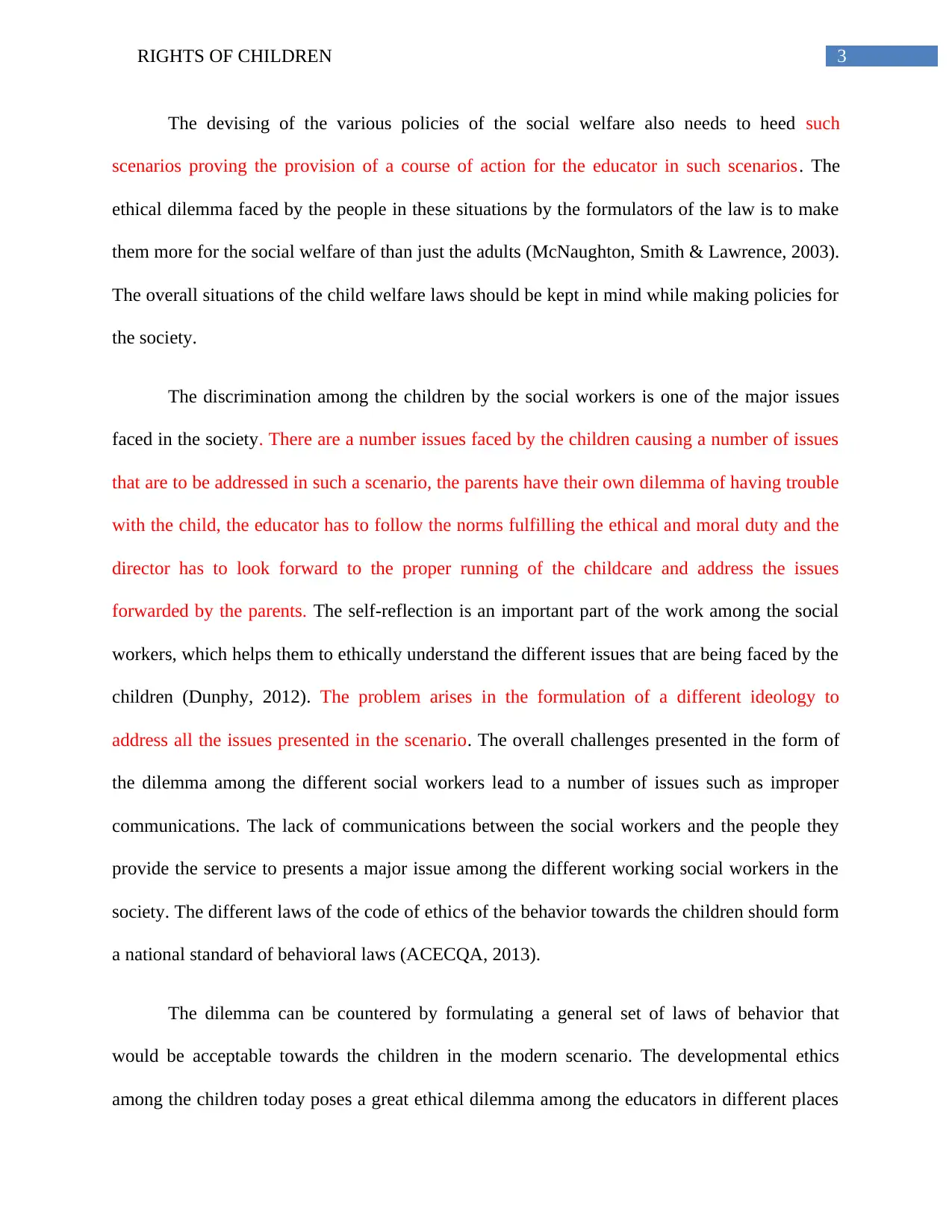
3RIGHTS OF CHILDREN
The devising of the various policies of the social welfare also needs to heed such
scenarios proving the provision of a course of action for the educator in such scenarios. The
ethical dilemma faced by the people in these situations by the formulators of the law is to make
them more for the social welfare of than just the adults (McNaughton, Smith & Lawrence, 2003).
The overall situations of the child welfare laws should be kept in mind while making policies for
the society.
The discrimination among the children by the social workers is one of the major issues
faced in the society. There are a number issues faced by the children causing a number of issues
that are to be addressed in such a scenario, the parents have their own dilemma of having trouble
with the child, the educator has to follow the norms fulfilling the ethical and moral duty and the
director has to look forward to the proper running of the childcare and address the issues
forwarded by the parents. The self-reflection is an important part of the work among the social
workers, which helps them to ethically understand the different issues that are being faced by the
children (Dunphy, 2012). The problem arises in the formulation of a different ideology to
address all the issues presented in the scenario. The overall challenges presented in the form of
the dilemma among the different social workers lead to a number of issues such as improper
communications. The lack of communications between the social workers and the people they
provide the service to presents a major issue among the different working social workers in the
society. The different laws of the code of ethics of the behavior towards the children should form
a national standard of behavioral laws (ACECQA, 2013).
The dilemma can be countered by formulating a general set of laws of behavior that
would be acceptable towards the children in the modern scenario. The developmental ethics
among the children today poses a great ethical dilemma among the educators in different places
The devising of the various policies of the social welfare also needs to heed such
scenarios proving the provision of a course of action for the educator in such scenarios. The
ethical dilemma faced by the people in these situations by the formulators of the law is to make
them more for the social welfare of than just the adults (McNaughton, Smith & Lawrence, 2003).
The overall situations of the child welfare laws should be kept in mind while making policies for
the society.
The discrimination among the children by the social workers is one of the major issues
faced in the society. There are a number issues faced by the children causing a number of issues
that are to be addressed in such a scenario, the parents have their own dilemma of having trouble
with the child, the educator has to follow the norms fulfilling the ethical and moral duty and the
director has to look forward to the proper running of the childcare and address the issues
forwarded by the parents. The self-reflection is an important part of the work among the social
workers, which helps them to ethically understand the different issues that are being faced by the
children (Dunphy, 2012). The problem arises in the formulation of a different ideology to
address all the issues presented in the scenario. The overall challenges presented in the form of
the dilemma among the different social workers lead to a number of issues such as improper
communications. The lack of communications between the social workers and the people they
provide the service to presents a major issue among the different working social workers in the
society. The different laws of the code of ethics of the behavior towards the children should form
a national standard of behavioral laws (ACECQA, 2013).
The dilemma can be countered by formulating a general set of laws of behavior that
would be acceptable towards the children in the modern scenario. The developmental ethics
among the children today poses a great ethical dilemma among the educators in different places
Paraphrase This Document
Need a fresh take? Get an instant paraphrase of this document with our AI Paraphraser
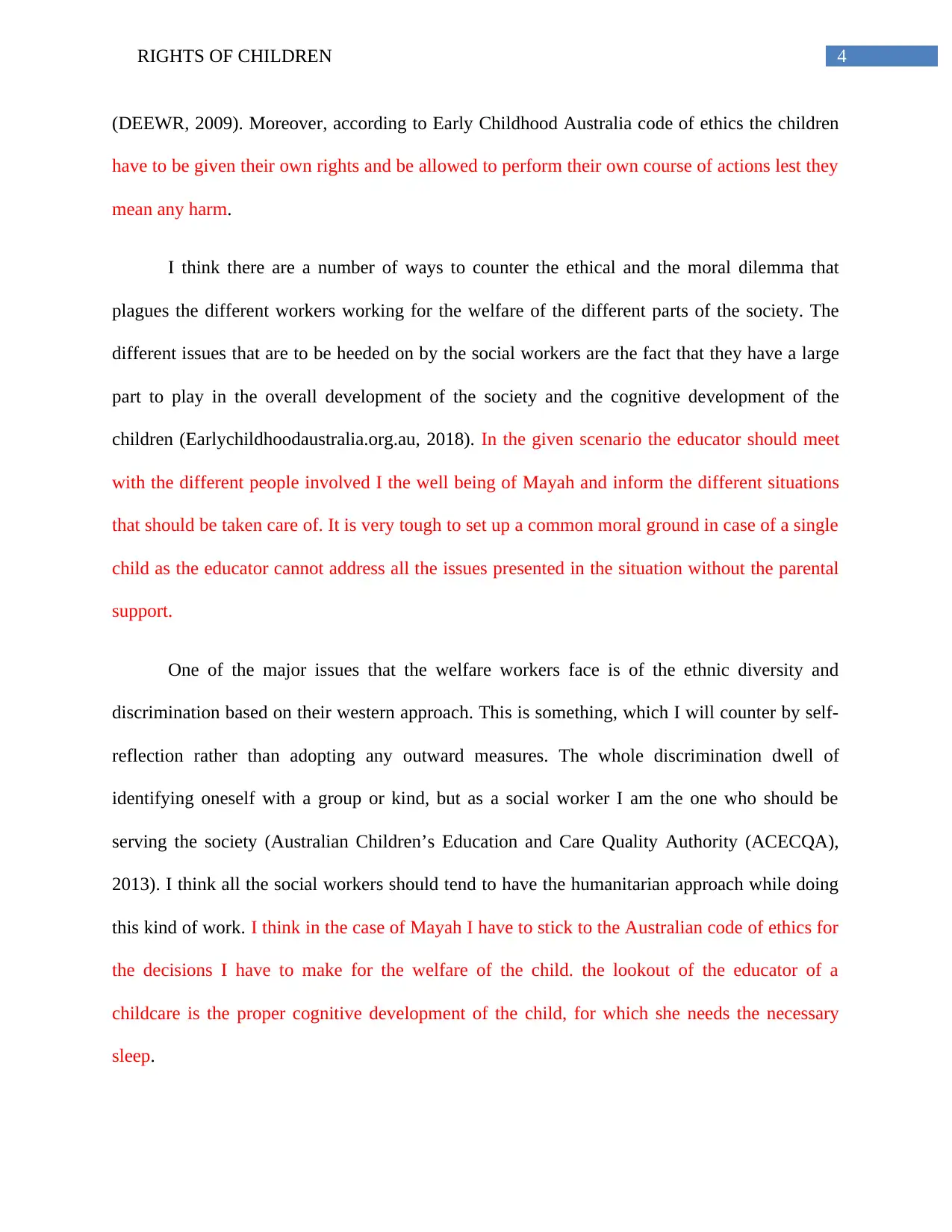
4RIGHTS OF CHILDREN
(DEEWR, 2009). Moreover, according to Early Childhood Australia code of ethics the children
have to be given their own rights and be allowed to perform their own course of actions lest they
mean any harm.
I think there are a number of ways to counter the ethical and the moral dilemma that
plagues the different workers working for the welfare of the different parts of the society. The
different issues that are to be heeded on by the social workers are the fact that they have a large
part to play in the overall development of the society and the cognitive development of the
children (Earlychildhoodaustralia.org.au, 2018). In the given scenario the educator should meet
with the different people involved I the well being of Mayah and inform the different situations
that should be taken care of. It is very tough to set up a common moral ground in case of a single
child as the educator cannot address all the issues presented in the situation without the parental
support.
One of the major issues that the welfare workers face is of the ethnic diversity and
discrimination based on their western approach. This is something, which I will counter by self-
reflection rather than adopting any outward measures. The whole discrimination dwell of
identifying oneself with a group or kind, but as a social worker I am the one who should be
serving the society (Australian Children’s Education and Care Quality Authority (ACECQA),
2013). I think all the social workers should tend to have the humanitarian approach while doing
this kind of work. I think in the case of Mayah I have to stick to the Australian code of ethics for
the decisions I have to make for the welfare of the child. the lookout of the educator of a
childcare is the proper cognitive development of the child, for which she needs the necessary
sleep.
(DEEWR, 2009). Moreover, according to Early Childhood Australia code of ethics the children
have to be given their own rights and be allowed to perform their own course of actions lest they
mean any harm.
I think there are a number of ways to counter the ethical and the moral dilemma that
plagues the different workers working for the welfare of the different parts of the society. The
different issues that are to be heeded on by the social workers are the fact that they have a large
part to play in the overall development of the society and the cognitive development of the
children (Earlychildhoodaustralia.org.au, 2018). In the given scenario the educator should meet
with the different people involved I the well being of Mayah and inform the different situations
that should be taken care of. It is very tough to set up a common moral ground in case of a single
child as the educator cannot address all the issues presented in the situation without the parental
support.
One of the major issues that the welfare workers face is of the ethnic diversity and
discrimination based on their western approach. This is something, which I will counter by self-
reflection rather than adopting any outward measures. The whole discrimination dwell of
identifying oneself with a group or kind, but as a social worker I am the one who should be
serving the society (Australian Children’s Education and Care Quality Authority (ACECQA),
2013). I think all the social workers should tend to have the humanitarian approach while doing
this kind of work. I think in the case of Mayah I have to stick to the Australian code of ethics for
the decisions I have to make for the welfare of the child. the lookout of the educator of a
childcare is the proper cognitive development of the child, for which she needs the necessary
sleep.
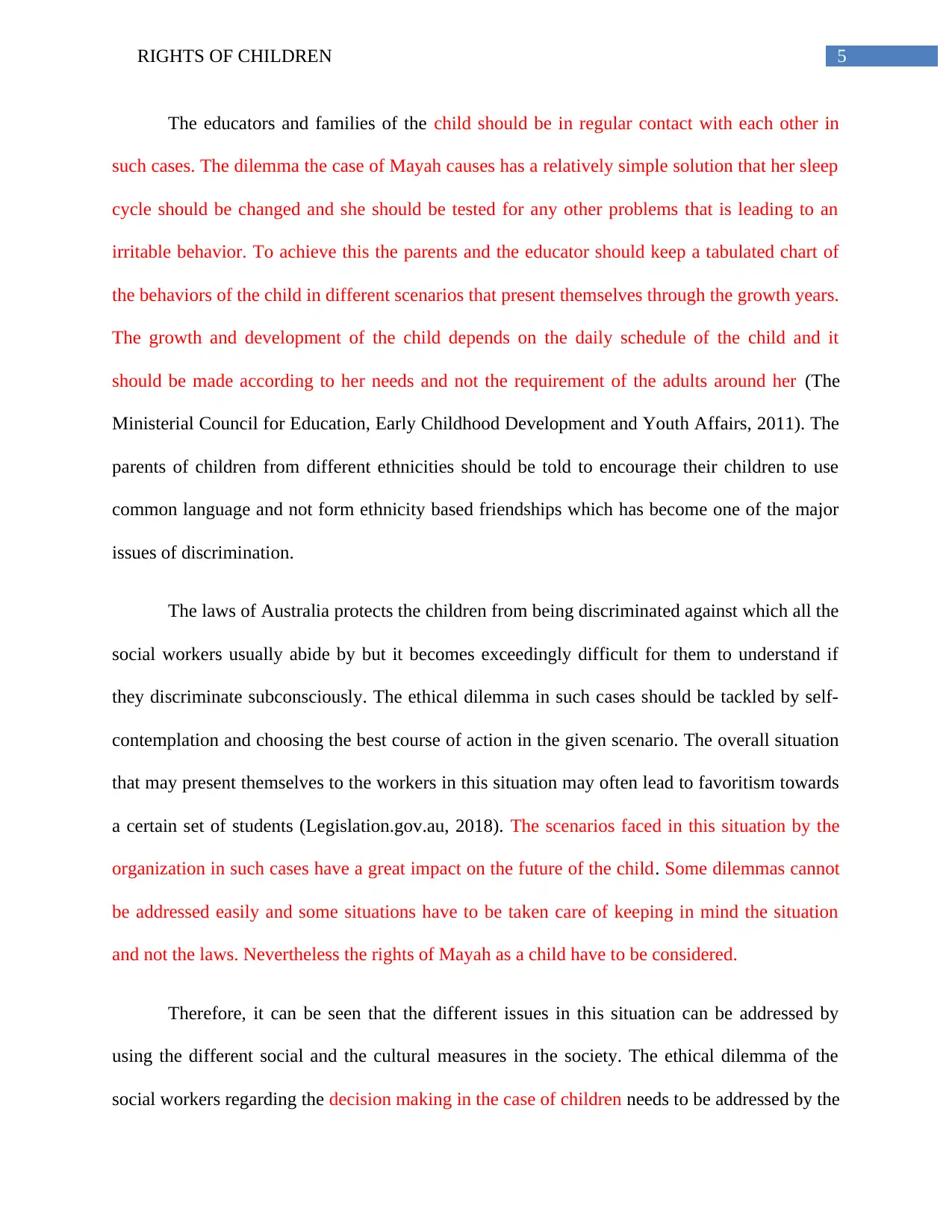
5RIGHTS OF CHILDREN
The educators and families of the child should be in regular contact with each other in
such cases. The dilemma the case of Mayah causes has a relatively simple solution that her sleep
cycle should be changed and she should be tested for any other problems that is leading to an
irritable behavior. To achieve this the parents and the educator should keep a tabulated chart of
the behaviors of the child in different scenarios that present themselves through the growth years.
The growth and development of the child depends on the daily schedule of the child and it
should be made according to her needs and not the requirement of the adults around her (The
Ministerial Council for Education, Early Childhood Development and Youth Affairs, 2011). The
parents of children from different ethnicities should be told to encourage their children to use
common language and not form ethnicity based friendships which has become one of the major
issues of discrimination.
The laws of Australia protects the children from being discriminated against which all the
social workers usually abide by but it becomes exceedingly difficult for them to understand if
they discriminate subconsciously. The ethical dilemma in such cases should be tackled by self-
contemplation and choosing the best course of action in the given scenario. The overall situation
that may present themselves to the workers in this situation may often lead to favoritism towards
a certain set of students (Legislation.gov.au, 2018). The scenarios faced in this situation by the
organization in such cases have a great impact on the future of the child. Some dilemmas cannot
be addressed easily and some situations have to be taken care of keeping in mind the situation
and not the laws. Nevertheless the rights of Mayah as a child have to be considered.
Therefore, it can be seen that the different issues in this situation can be addressed by
using the different social and the cultural measures in the society. The ethical dilemma of the
social workers regarding the decision making in the case of children needs to be addressed by the
The educators and families of the child should be in regular contact with each other in
such cases. The dilemma the case of Mayah causes has a relatively simple solution that her sleep
cycle should be changed and she should be tested for any other problems that is leading to an
irritable behavior. To achieve this the parents and the educator should keep a tabulated chart of
the behaviors of the child in different scenarios that present themselves through the growth years.
The growth and development of the child depends on the daily schedule of the child and it
should be made according to her needs and not the requirement of the adults around her (The
Ministerial Council for Education, Early Childhood Development and Youth Affairs, 2011). The
parents of children from different ethnicities should be told to encourage their children to use
common language and not form ethnicity based friendships which has become one of the major
issues of discrimination.
The laws of Australia protects the children from being discriminated against which all the
social workers usually abide by but it becomes exceedingly difficult for them to understand if
they discriminate subconsciously. The ethical dilemma in such cases should be tackled by self-
contemplation and choosing the best course of action in the given scenario. The overall situation
that may present themselves to the workers in this situation may often lead to favoritism towards
a certain set of students (Legislation.gov.au, 2018). The scenarios faced in this situation by the
organization in such cases have a great impact on the future of the child. Some dilemmas cannot
be addressed easily and some situations have to be taken care of keeping in mind the situation
and not the laws. Nevertheless the rights of Mayah as a child have to be considered.
Therefore, it can be seen that the different issues in this situation can be addressed by
using the different social and the cultural measures in the society. The ethical dilemma of the
social workers regarding the decision making in the case of children needs to be addressed by the
⊘ This is a preview!⊘
Do you want full access?
Subscribe today to unlock all pages.

Trusted by 1+ million students worldwide
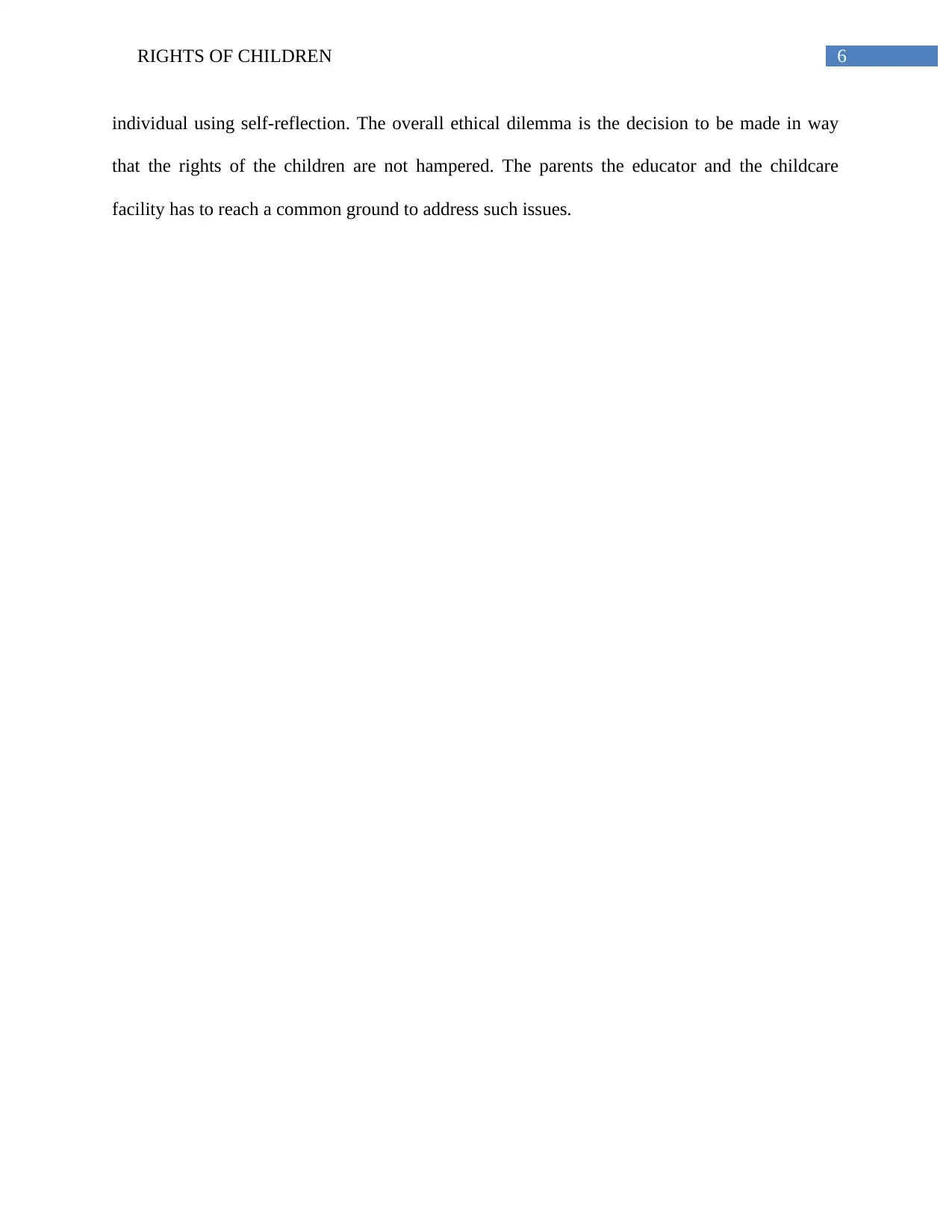
6RIGHTS OF CHILDREN
individual using self-reflection. The overall ethical dilemma is the decision to be made in way
that the rights of the children are not hampered. The parents the educator and the childcare
facility has to reach a common ground to address such issues.
individual using self-reflection. The overall ethical dilemma is the decision to be made in way
that the rights of the children are not hampered. The parents the educator and the childcare
facility has to reach a common ground to address such issues.
Paraphrase This Document
Need a fresh take? Get an instant paraphrase of this document with our AI Paraphraser
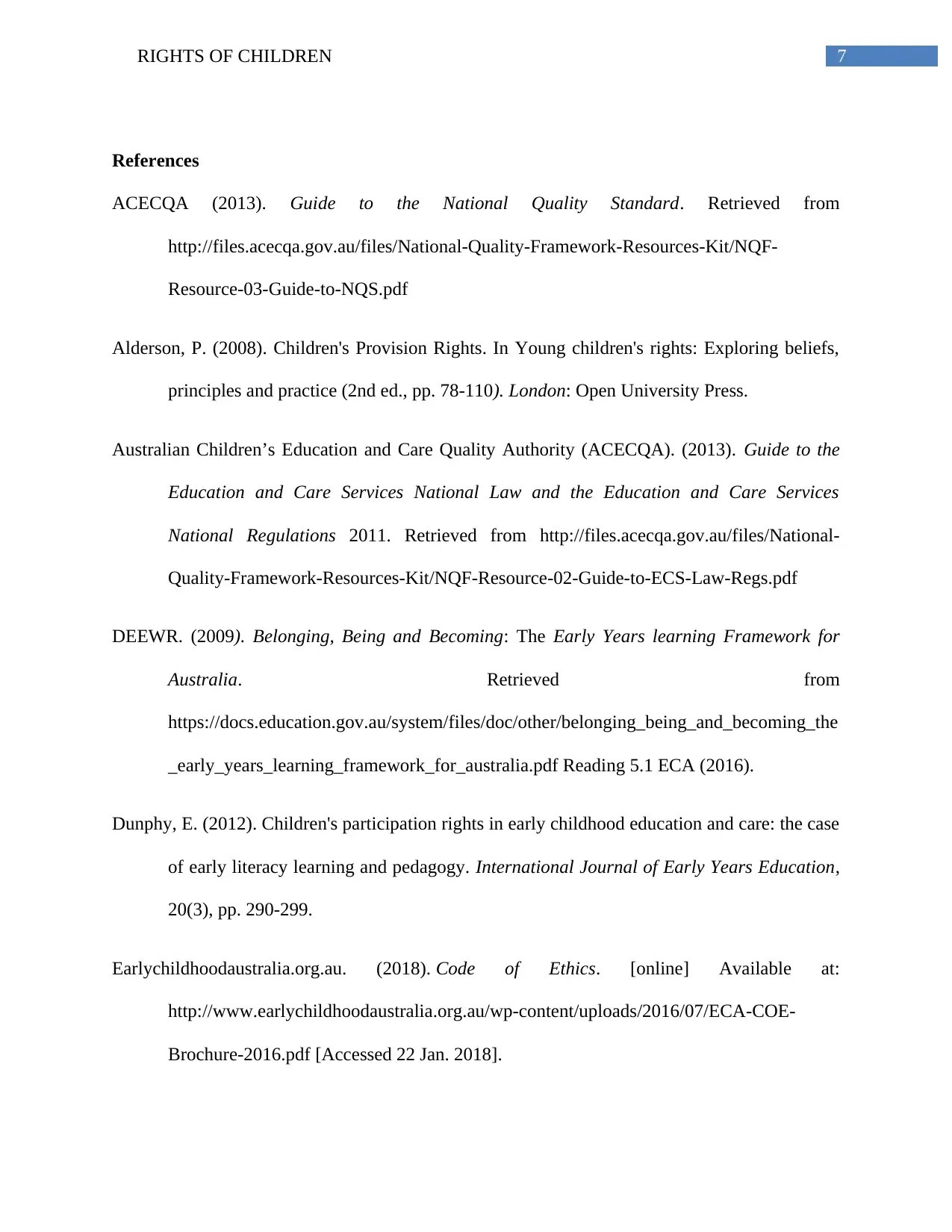
7RIGHTS OF CHILDREN
References
ACECQA (2013). Guide to the National Quality Standard. Retrieved from
http://files.acecqa.gov.au/files/National-Quality-Framework-Resources-Kit/NQF-
Resource-03-Guide-to-NQS.pdf
Alderson, P. (2008). Children's Provision Rights. In Young children's rights: Exploring beliefs,
principles and practice (2nd ed., pp. 78-110). London: Open University Press.
Australian Children’s Education and Care Quality Authority (ACECQA). (2013). Guide to the
Education and Care Services National Law and the Education and Care Services
National Regulations 2011. Retrieved from http://files.acecqa.gov.au/files/National-
Quality-Framework-Resources-Kit/NQF-Resource-02-Guide-to-ECS-Law-Regs.pdf
DEEWR. (2009). Belonging, Being and Becoming: The Early Years learning Framework for
Australia. Retrieved from
https://docs.education.gov.au/system/files/doc/other/belonging_being_and_becoming_the
_early_years_learning_framework_for_australia.pdf Reading 5.1 ECA (2016).
Dunphy, E. (2012). Children's participation rights in early childhood education and care: the case
of early literacy learning and pedagogy. International Journal of Early Years Education,
20(3), pp. 290-299.
Earlychildhoodaustralia.org.au. (2018). Code of Ethics. [online] Available at:
http://www.earlychildhoodaustralia.org.au/wp-content/uploads/2016/07/ECA-COE-
Brochure-2016.pdf [Accessed 22 Jan. 2018].
References
ACECQA (2013). Guide to the National Quality Standard. Retrieved from
http://files.acecqa.gov.au/files/National-Quality-Framework-Resources-Kit/NQF-
Resource-03-Guide-to-NQS.pdf
Alderson, P. (2008). Children's Provision Rights. In Young children's rights: Exploring beliefs,
principles and practice (2nd ed., pp. 78-110). London: Open University Press.
Australian Children’s Education and Care Quality Authority (ACECQA). (2013). Guide to the
Education and Care Services National Law and the Education and Care Services
National Regulations 2011. Retrieved from http://files.acecqa.gov.au/files/National-
Quality-Framework-Resources-Kit/NQF-Resource-02-Guide-to-ECS-Law-Regs.pdf
DEEWR. (2009). Belonging, Being and Becoming: The Early Years learning Framework for
Australia. Retrieved from
https://docs.education.gov.au/system/files/doc/other/belonging_being_and_becoming_the
_early_years_learning_framework_for_australia.pdf Reading 5.1 ECA (2016).
Dunphy, E. (2012). Children's participation rights in early childhood education and care: the case
of early literacy learning and pedagogy. International Journal of Early Years Education,
20(3), pp. 290-299.
Earlychildhoodaustralia.org.au. (2018). Code of Ethics. [online] Available at:
http://www.earlychildhoodaustralia.org.au/wp-content/uploads/2016/07/ECA-COE-
Brochure-2016.pdf [Accessed 22 Jan. 2018].
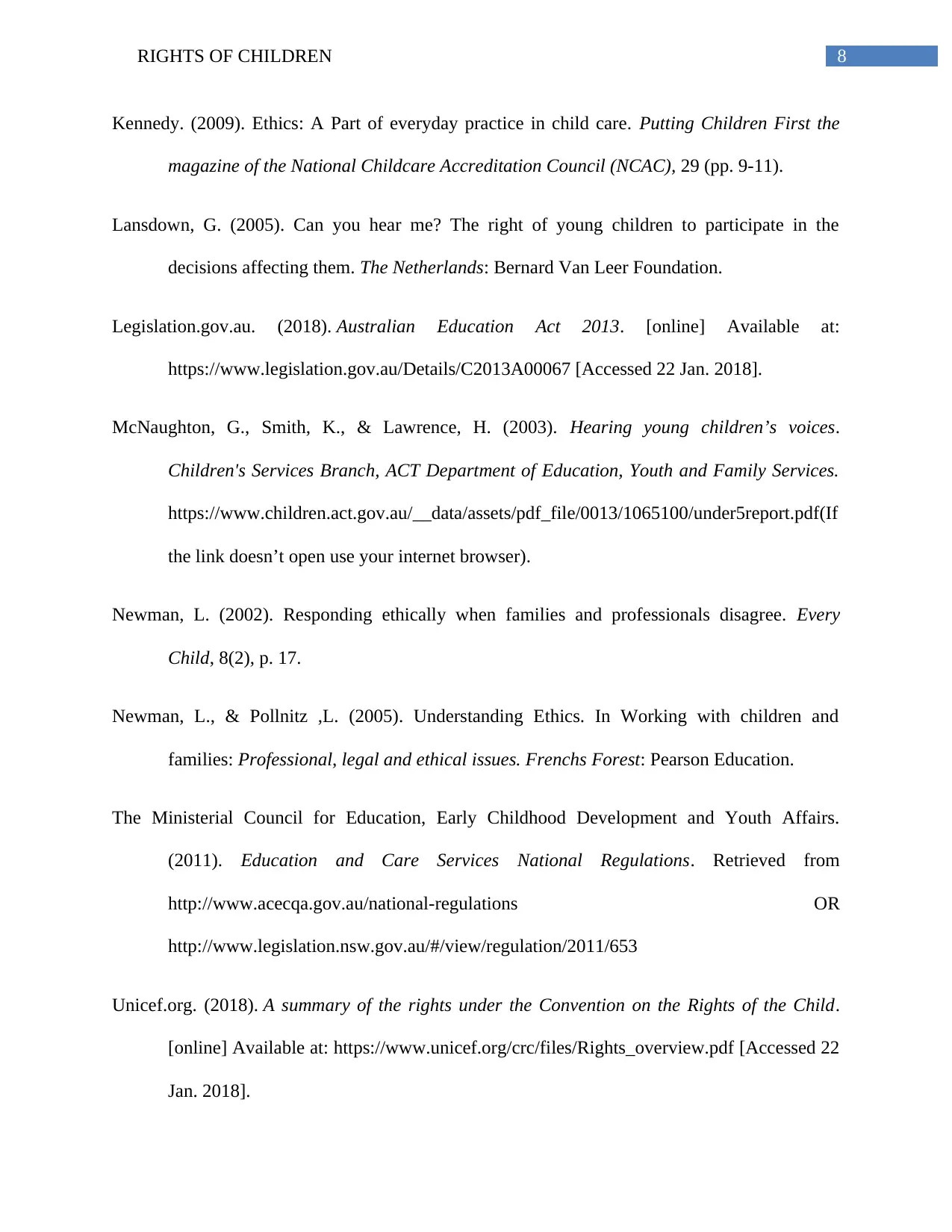
8RIGHTS OF CHILDREN
Kennedy. (2009). Ethics: A Part of everyday practice in child care. Putting Children First the
magazine of the National Childcare Accreditation Council (NCAC), 29 (pp. 9-11).
Lansdown, G. (2005). Can you hear me? The right of young children to participate in the
decisions affecting them. The Netherlands: Bernard Van Leer Foundation.
Legislation.gov.au. (2018). Australian Education Act 2013. [online] Available at:
https://www.legislation.gov.au/Details/C2013A00067 [Accessed 22 Jan. 2018].
McNaughton, G., Smith, K., & Lawrence, H. (2003). Hearing young children’s voices.
Children's Services Branch, ACT Department of Education, Youth and Family Services.
https://www.children.act.gov.au/__data/assets/pdf_file/0013/1065100/under5report.pdf(If
the link doesn’t open use your internet browser).
Newman, L. (2002). Responding ethically when families and professionals disagree. Every
Child, 8(2), p. 17.
Newman, L., & Pollnitz ,L. (2005). Understanding Ethics. In Working with children and
families: Professional, legal and ethical issues. Frenchs Forest: Pearson Education.
The Ministerial Council for Education, Early Childhood Development and Youth Affairs.
(2011). Education and Care Services National Regulations. Retrieved from
http://www.acecqa.gov.au/national-regulations OR
http://www.legislation.nsw.gov.au/#/view/regulation/2011/653
Unicef.org. (2018). A summary of the rights under the Convention on the Rights of the Child.
[online] Available at: https://www.unicef.org/crc/files/Rights_overview.pdf [Accessed 22
Jan. 2018].
Kennedy. (2009). Ethics: A Part of everyday practice in child care. Putting Children First the
magazine of the National Childcare Accreditation Council (NCAC), 29 (pp. 9-11).
Lansdown, G. (2005). Can you hear me? The right of young children to participate in the
decisions affecting them. The Netherlands: Bernard Van Leer Foundation.
Legislation.gov.au. (2018). Australian Education Act 2013. [online] Available at:
https://www.legislation.gov.au/Details/C2013A00067 [Accessed 22 Jan. 2018].
McNaughton, G., Smith, K., & Lawrence, H. (2003). Hearing young children’s voices.
Children's Services Branch, ACT Department of Education, Youth and Family Services.
https://www.children.act.gov.au/__data/assets/pdf_file/0013/1065100/under5report.pdf(If
the link doesn’t open use your internet browser).
Newman, L. (2002). Responding ethically when families and professionals disagree. Every
Child, 8(2), p. 17.
Newman, L., & Pollnitz ,L. (2005). Understanding Ethics. In Working with children and
families: Professional, legal and ethical issues. Frenchs Forest: Pearson Education.
The Ministerial Council for Education, Early Childhood Development and Youth Affairs.
(2011). Education and Care Services National Regulations. Retrieved from
http://www.acecqa.gov.au/national-regulations OR
http://www.legislation.nsw.gov.au/#/view/regulation/2011/653
Unicef.org. (2018). A summary of the rights under the Convention on the Rights of the Child.
[online] Available at: https://www.unicef.org/crc/files/Rights_overview.pdf [Accessed 22
Jan. 2018].
⊘ This is a preview!⊘
Do you want full access?
Subscribe today to unlock all pages.

Trusted by 1+ million students worldwide
1 out of 9
Related Documents
Your All-in-One AI-Powered Toolkit for Academic Success.
+13062052269
info@desklib.com
Available 24*7 on WhatsApp / Email
![[object Object]](/_next/static/media/star-bottom.7253800d.svg)
Unlock your academic potential
Copyright © 2020–2026 A2Z Services. All Rights Reserved. Developed and managed by ZUCOL.





